Advertisements
Online Mock Tests
Chapters
2: Sales Tax and Value Added Tax
3: Banking
4: Shares and Dividends
5: Linear Inequations (Solving Linear Inequations in One Variable)
6: Quadratic Equation
7: Reflection
8: Ratio and Proportion
9: Factorization
10: Matrices
11: Coordinate Geometry
▶ 12: Symmetry
13: Similarity
14: Loci (Locus and its Constructions)
15: Circles
16: Constructions (Circle)
17: Mensuration
18: Trigonometry
19: Statistics
20: Probability
![ICSE solutions for Mathematics [English] Class 10 chapter 12 - Symmetry ICSE solutions for Mathematics [English] Class 10 chapter 12 - Symmetry - Shaalaa.com](/images/mathematics-english-class-10_6:5f2b1b2038084cf381bfa42c826a928c.jpg)
Advertisements
Solutions for Chapter 12: Symmetry
Below listed, you can find solutions for Chapter 12 of CISCE ICSE for Mathematics [English] Class 10.
ICSE solutions for Mathematics [English] Class 10 12 Symmetry Figure Based Questions
In each of the figure below, an additional line is indicated by dots. Observe, name the figure and state if the figure is symmetrical about the dotted line.
In each of the figure below, an additional line is indicated by dots. Observe, name the figure and state if the figure is symmetrical about the dotted line.
In each of the figure below, an additional line is indicated by dots. Observe, name the figure and state if the figure is symmetrical about the dotted line.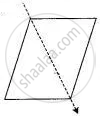
Every diameter of circle is an axis of the symmetry for the circle. Each of the figure below contain a circle or a part of a circle. State the number of axis of symmetry in each case and also indicate them.


Draw a line of symmetry of semi-circle.
In the figure below are an isosceles triangle; state if the triangle is a symmetrical figure. If a figure is symmetrical, state the number of axis of symmetry and indicate them by dotted line.
In the figure below are an isosceles triangle; state if the triangle is a symmetrical figure. If a figure is symmetrical, state the number of axis of symmetry and indicate them by dotted line.
In the figure below are an isosceles triangle; state if the triangle is a symmetrical figure. If a figure is symmetrical, state the number of axis of symmetry and indicate them by dotted line.
Draw a diagram and name the figure in the following:
A quadrilateral having four lines of symmetry, two of which contain its diagonals.
Draw a diagram and name the figure in the following:
A triangle with only one line of symmetry.
Draw a diagram and name the figure in the following:
A quadrilateral having only one line of symmetry.
In each of the figure below, state the number of axes of symmetry, if any.
In each of the figure below, state the number of axes of symmetry, if any.
In each of the figure below, state the number of axes of symmetry, if any.
Draw an isosceles ΔABC, where BC = 3.5 cm, the base angles C and B = 75°. Use ruler and compass only. Draw all lines of symmetry of the triangle.
Construct a rectangle ABCD with AB = 5 cm and AD = 3cm. Construct its lines of symmetry.
Draw an equilateral triangle each of whose side is 4 cm. Draw all its lines of symmetry.
Draw two circles each of radius 2.5 cm touching each other. Construct the lines of symmetry of these circles.
Use a ruler and compass only in this question.
Construct the quadrilateral ABCD in which AB = 5 cm, BC = 7 cm and angle ABC = 120°, given that AC is its only line of symmetry.
Use a ruler and compass only in this question.
Write down the geometrical name of the quadrilateral.
Part of geometrical figure is given in each of the diagrams below. Complete the figures, so that the line ‘m’, in each case, is the line of symmetry, of the completed figure. Recognizable free hand sketches, would be awarded full marks.
Part of geometrical figure is given in each of the diagrams below. Complete the figures, so that the line ‘m’, in each case, is the line of symmetry, of the completed figure. Recognizable free hand sketches, would be awarded full marks.
Part of geometrical figure is given in each of the diagrams below. Complete the figures, so that the line ‘m’, in each case, is the line of symmetry, of the completed figure. Recognizable free hand sketches, would be awarded full marks.
Part of geometrical figure is given in each of the diagrams below. Complete the figures, so that the line ‘m’, in each case, is the line of symmetry, of the completed figure. Recognizable free hand sketches, would be awarded full marks.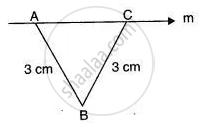
Draw an equilateral triangle each of whose sides is 4 cm. Draw all its lines of symmetry.
Construct a ΔABC, in which AB = AC = 3 cm and BC = 2cm. Using a ruler and compasses only, draw the reflection of A’BC of ΔABC, in BC. Draw the lines of symmetry in the figure ABA’C.
A quadrilateral ABCD has exactly one axis of symmetry, which is not a diagonal. Show that the quadrilateral is an isosoeles trapezium.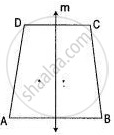
Part of a geometrical figure is given in each of the diagram below. Complete the figures so that both the X-axis and the Y-axis are lines of symmetry of the completed figure.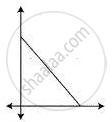
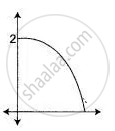
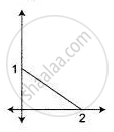

Give the geometrical name of the completed figure.
(You may use graph paper if required).
Freehand sketches would be sufficient.
Part of a geometrical figure is given in each of the diagrams below. Complete the figures so. that the line AB in each case is a line of symmetry of the completed figure.
Give also the geometrical name for the completed figure. Recognizable free hand Sketches would be awarded full marks.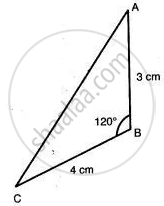
Part of a geometrical figure is given in each of the diagrams below. Complete the figures so. that the line AB in each case is a line of symmetry of the completed figure.
Give also the geometrical name for the completed figure. Recognizable free hand Sketches would be awarded full marks.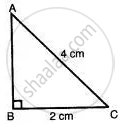
Part of a geometrical figure is given in each of the diagrams below. Complete the figures so. that the line AB in each case is a line of symmetry of the completed figure.
Give also the geometrical name for the completed figure. Recognizable free hand Sketches would be awarded full marks.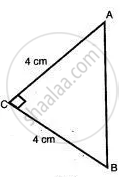
Part of a geometrical figure is given in each of the diagrams below. Complete the figures so. that the line AB in each case is a line of symmetry of the completed figure.
Give also the geometrical name for the completed figure. Recognizable free hand Sketches would be awarded full marks.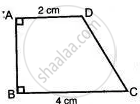
Solutions for 12: Symmetry
![ICSE solutions for Mathematics [English] Class 10 chapter 12 - Symmetry ICSE solutions for Mathematics [English] Class 10 chapter 12 - Symmetry - Shaalaa.com](/images/mathematics-english-class-10_6:5f2b1b2038084cf381bfa42c826a928c.jpg)
ICSE solutions for Mathematics [English] Class 10 chapter 12 - Symmetry
Shaalaa.com has the CISCE Mathematics Mathematics [English] Class 10 CISCE solutions in a manner that help students grasp basic concepts better and faster. The detailed, step-by-step solutions will help you understand the concepts better and clarify any confusion. ICSE solutions for Mathematics Mathematics [English] Class 10 CISCE 12 (Symmetry) include all questions with answers and detailed explanations. This will clear students' doubts about questions and improve their application skills while preparing for board exams.
Further, we at Shaalaa.com provide such solutions so students can prepare for written exams. ICSE textbook solutions can be a core help for self-study and provide excellent self-help guidance for students.
Concepts covered in Mathematics [English] Class 10 chapter 12 Symmetry are Concept of Lines Symmetry, Concept of Symmetry.
Using ICSE Mathematics [English] Class 10 solutions Symmetry exercise by students is an easy way to prepare for the exams, as they involve solutions arranged chapter-wise and also page-wise. The questions involved in ICSE Solutions are essential questions that can be asked in the final exam. Maximum CISCE Mathematics [English] Class 10 students prefer ICSE Textbook Solutions to score more in exams.
Get the free view of Chapter 12, Symmetry Mathematics [English] Class 10 additional questions for Mathematics Mathematics [English] Class 10 CISCE, and you can use Shaalaa.com to keep it handy for your exam preparation.
